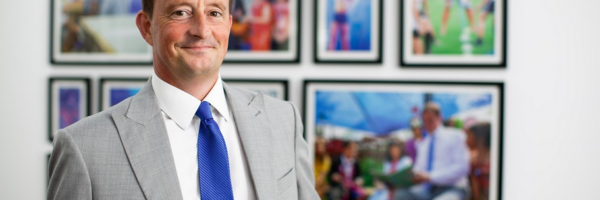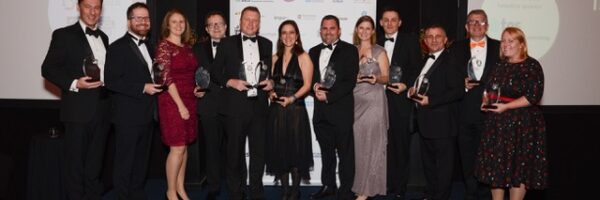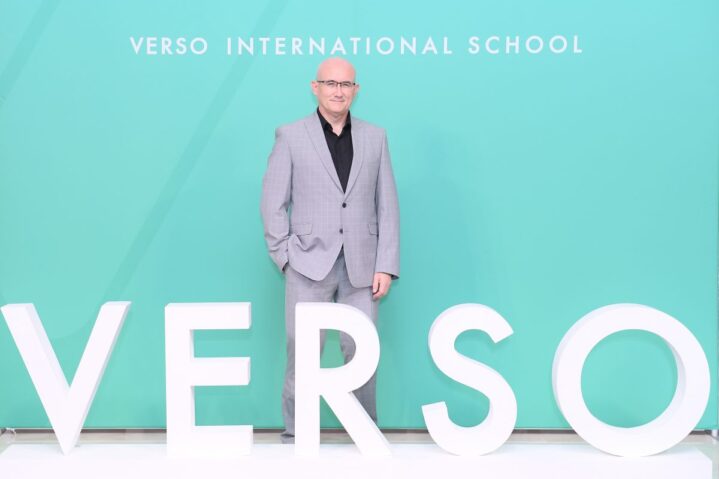
VERSO Founding Head Cameron Fox
VERSO International School opens in August 2020 near Bangna and Expat Life was honoured to be able to interview the founding headmaster Cameron Fox.
In a bold departure from the traditional school design process, VERSO is a school unlike any other. In a groundbreaking partnership with IDEO, the San Francisco based global design and innovation company, VERSO gives Bangkok, a compelling and inspirational vision for the future of international education.
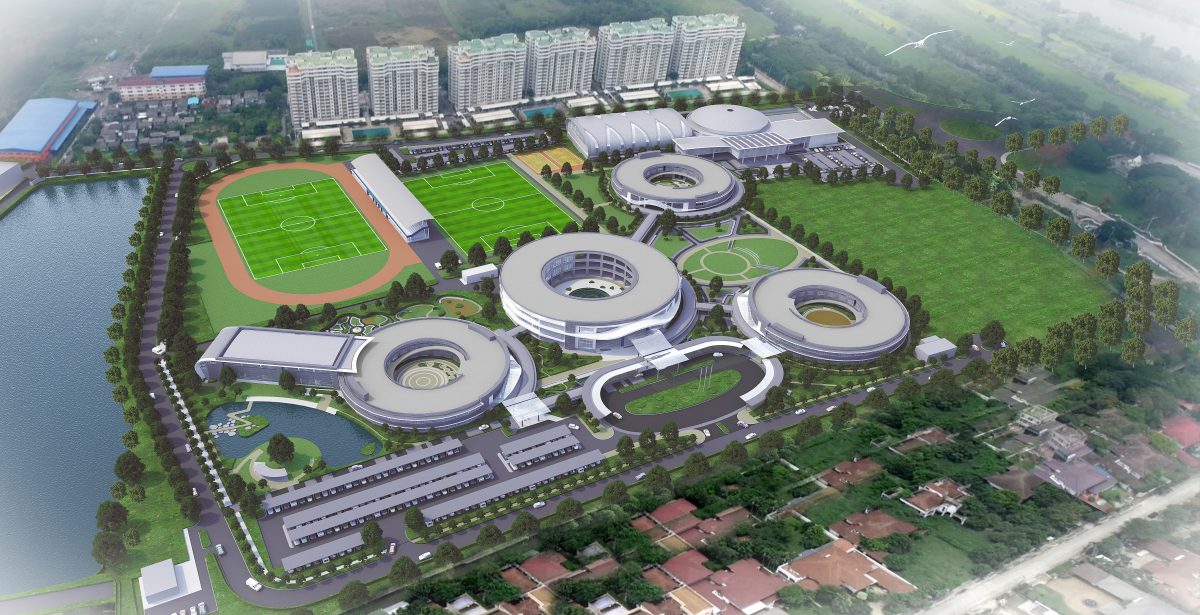
VERSO’s iconic looped buildings and architecture was inspired by up-to-date research in learning space design
Using human-centred design, they are creating a unique architectural environment offering operational structures, physical spaces and a learning culture to produce innovative, entrepreneurial lifelong learners prepared for a dynamically shifting future.
VERSO values and responds to the uniqueness of each child to develop a strong sense of personal and cultural identity, an ability to engage with the world and the confidence to lead their own journey.
Where are you from and what is your educational background?
I’m originally from Scotland and I did my undergraduate studies at the University of Strathclyde where I studied Politics and Industrial Relations. I was the first person in my family to go to university. I moved to Hong Kong in 1993 and then did a master’s degree through the University of York in the UK in Teaching English to Young Learners, which was the first distance learning programme introduced by the university. I then did a post graduate diploma in Education at the University of Hong Kong, where I got my full teaching qualification.
What attracted you to teaching?
When I went to university, I didn’t foresee a career in education. That came later. When I finished university and was looking for my next step, at that time, the opportunities in the UK were quite limited. It was a time when jobs were difficult to find, so Hong Kong was an attractive place to go because there were lots of opportunities there. I initially got a job at a language institute and that’s where I really started my teaching career and developed a good rapport with students and found that I enjoyed it.
When did you first become a headmaster?
When I joined the American International School in Hong Kong in 2000, I went in as one of the founding teachers in their new middle school. Shortly after I joined the person who was in charge of the middle school left, so there was a leadership opportunity available. I was invited to step into the position. It happened quite quickly when I joined AIS. I became a Vice Principal and then a Principal before becoming the Head of School. I spent 19 years as an administrator at AIS.
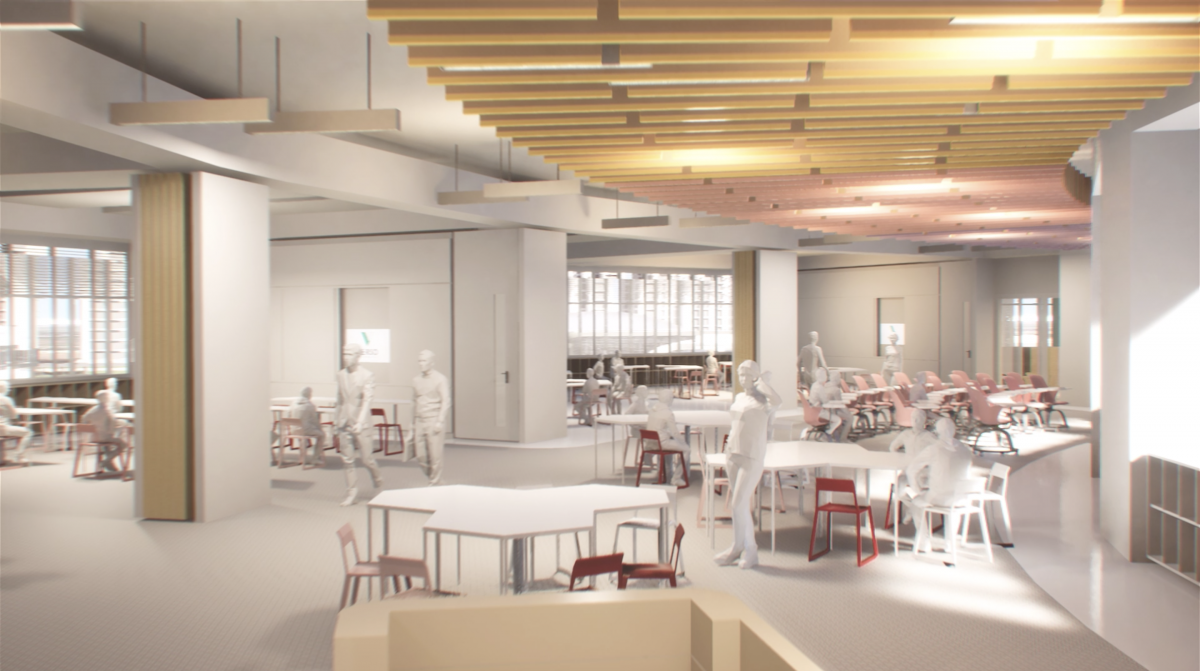
Learning spaces at VERSO is an integrated and interdependent network of zones, levels and spaces where learning is limitless
Are you teaching at VERSO?
I won’t be so much involved in the day to day learning and teaching. A headmaster’s role is a much wider role nowadays. It’s about building the team. I feel my strength as a school leader is being able to develop a highly capable and confident team, and working closely with them to push the school forward.
Do you have a core team on board?
We recognised early on in this project how critical it would be to have people who understood what we were trying to do, or at least willing to go with us on this incredible journey. I approached a few people I trusted and asked if they wanted to be part of the project. We started small but now have 12 full time educators from around the world who are part of the leadership team. Together we are recruiting VERSO’s founding faculty.
When you open in August, how many teachers will you begin with?
We will probably have about 30-35 staff, in terms of faculty.
What are the benefits of an international education?
I see so many advantages. It is so rich in its diversity and gives families and students a much broader vision of the world. Families invest in their children’s education, so we have a huge responsibility to deliver a high quality school experience. Standards and expectations are high and that attracts great teachers. Why wouldn’t you want to work in an environment where you have this level of resources and support? International education is a highly dynamic and attractive sector to be in. The end result for the students is that they’re working with really high quality teachers in wonderful facilities and are getting an incredible experience. Everyone is in this together, it’s a partnership. There’s a sense of investment that merits high quality. It puts the onus on us to deliver and that’s what’s exciting about international schools.
Tell us about your facilities, everyone is talking about the architecture.
The architecture of the school is inspired by our research into the design of learning spaces. Today we understand so much more about the critical role our physical environment plays in the way we behave and learn. Our unique looped buildings are intentionally designed to promote a sense of flow and movement. The architecture is actually quite simple. It’s bright, spacious and allows us to be highly adaptive and responsive to the learning needs of our students. It’s an integrated and interdependent network of zones, levels and spaces where learning is limitless. The campus has been designed as an ecosystem that interconnects buildings and spaces with the natural landscape.
I think facilities are important and they must have a purpose and function. Function over form is important and at VERSO, it is all driven with learning in mind.
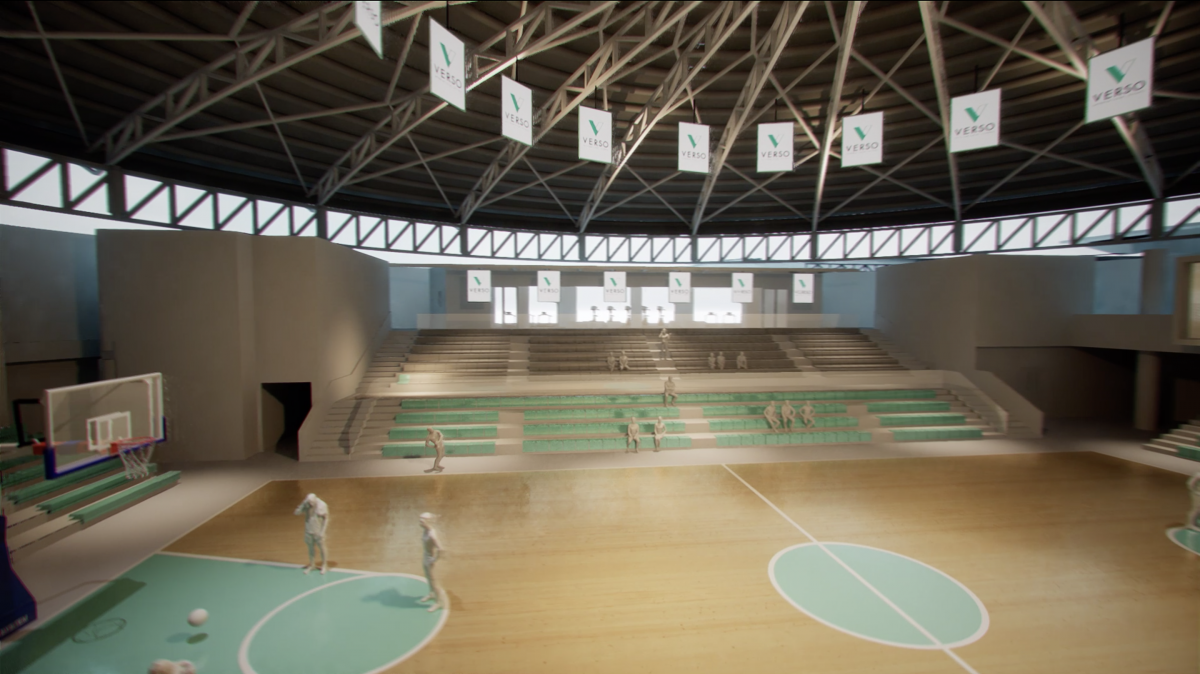
VERSO’s arena which will consist of basketball court, gym, climbing wall, yoga, stretching area and more
What are the challenges of third culture kid syndrome?
I have two daughters and my wife is from Hong Kong so they grew up in a bicultural environment. It’s been a very interesting journey as a head of school and a parent in the same school as my kids. I think where my daughters have benefited enormously is that they had a solid foot in the culture they were living. Hong Kong was their city even though their Dad was not from Hong Kong and they were at an international school. A lot of international school kids sense they exist in a bubble. They don’t quite know where they are or who they are. Our research showed that it was common for international school students to feel disconnected to the world beyond their school’s walls. The ability to transition, to build a community and understand what’s going on outside, is an essential skill for students who will probably remain internationally mobile way beyond their school years. Through our conversations with families, we realised that many schools don’t place a big enough emphasis on connecting deeply to the people, and issues in the communities where the school is situated. The school shouldn’t be a bubble. It needs to be porous, where ideas and influences flow in and out.
You talk a lot about connection, how will you foster that at VERSO?
VERSO places a huge emphasis on connections and developing networks. We are deeply committed to connecting the life of the school to the world around it and ‘popping the bubble’. As much as CEOs are very important players in networking, we are also interested in talking with small businesses and local entrepreneurs. We want to connect our learning to the outside world. It’s about finding new pathways and building opportunities for students to see how the work we do in school is relevant for their future. We want our students to see learning as meaningful, purposeful and how their work at school can be applied to the real world. We are training solution finders and problem solvers, and kids need to learn what this actually means. An important benefit for the businesses we partner with, is the insights they get from working with our students. It’s a really symbiotic relationship that we see as being a hallmark of a VERSO education.

Thailand’s only 50m climate-controlled Olympic standard indoor swimming pool
Tell me a bit about VERSO? What is unique?
VERSO is a really unique opportunity. There aren’t many of us who have been given the task of building a school from scratch to the scale that is expected here and with the resources we have been given. I have colleagues who have been involved in smaller start-up schools, but never with something as big as this.
The starting point for VERSO was a simple question: How can we design a new international school that will truly prepare its students for a world that is changing faster than at any other time in human history?
As experienced educators, we wanted all the good things we typically have in an international school, with the creative freedom to remove some of the unnecessary constraints that often restrict students from reaching their potential. If we were going to redesign a school, then I felt we should try to avoid the things that typically ‘trip us up’, and prevent us from delivering the school experience we believe kids should have.
So, we asked this question to people whose job it is to innovate, create, and look at things from a different angle. As educators, this can be a challenge because we’re also conditioned by years of being in traditional schools. That’s why we invited IDEO, one of the world’s leading design and innovation firms from San Francisco to help us. IDEO is famous for their ability to create positive impact through design. They are recognised globally for pioneering design thinking and using their human-centred design process to find innovative solutions for their clients. They were intrigued when we asked them if they would be interested in designing a new kind of international school. So, from the outset, VERSO is completely unique in terms of how it was conceived and designed. We didn’t go down the traditional route. We intentionally went outside of education to get a different perspective about what a future school could be like. That was in 2015.
We are not competing in the same space as traditional international schools. VERSO has been designed knowing that there is heavy competition in that market. We are simply thrilled and excited to be able to offer parents and students another choice, which we feel delivers a refreshing alternative to the very narrow academic funnel we traditionally push students through. VERSO is designed to give students a much more meaningful and personalised school experience that will actually give them more choices when they complete high school.
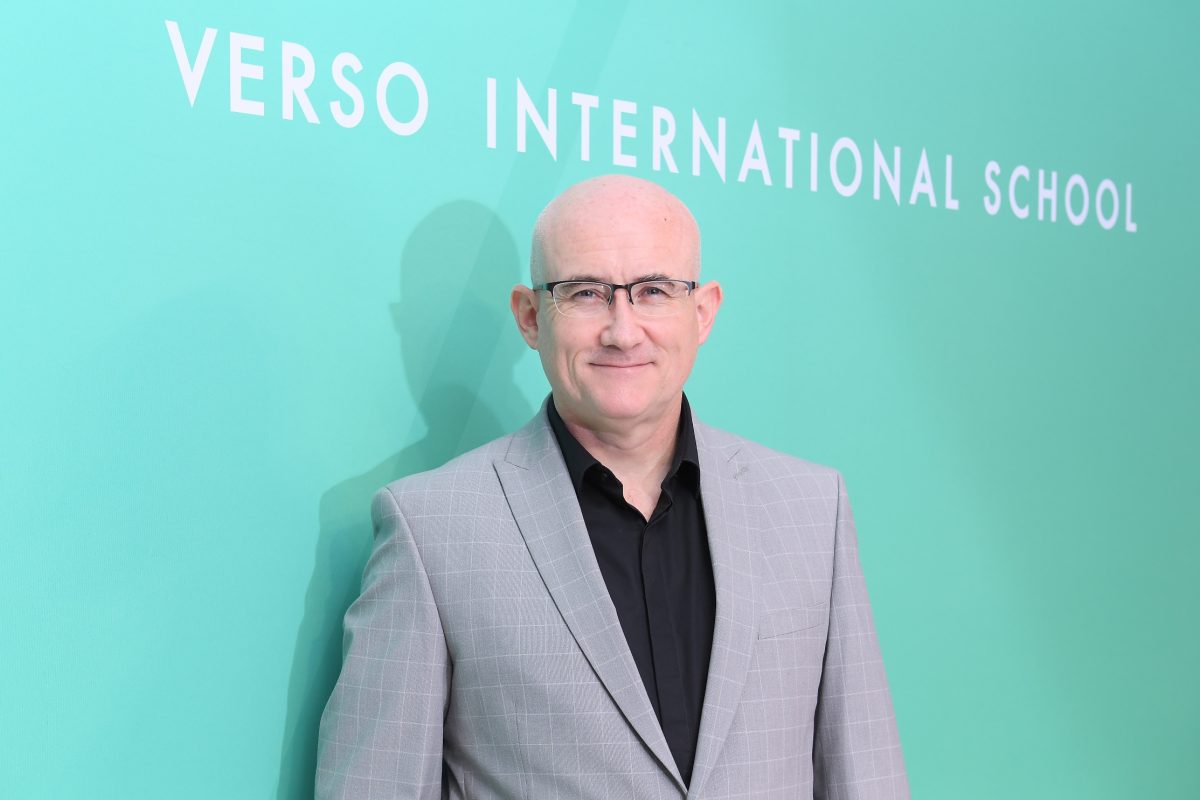
Cameron Fox: We want student to see learning as meaningful and purposeful
Where does the name VERSO come from?
VERSO is the Latin word for the left-hand page of an open book. It’s the page that’s been turned. Our innovative approach to school design, from our work with IDEO to the re-engineered curriculum, fits well with this idea of ‘turning the page’ and delivering something new and exciting.
What curriculum are you following?
VERSO delivers a re-engineered American curriculum that’s aligned with New York State’s Education Standards. We chose an American framework because it gives us greater flexibility to design powerful learning experiences that are interdisciplinary, project-based and skills-focussed.
Since we don’t believe in a one-size-fits-all approach to the curriculum, learning at VERSO will be increasingly personalised. We chose the New York State Education Standards because they’re comprehensive, research-based and internationally recognised. They also provide clear learning progressions for all students, outlining what learners should know and be able to do.
Is there a target student number?
The school has been designed for a maximum of 1,800 students with 600 students in the Lower Loop, the Middle Loop and the Upper Loop. During the school day, students will work in a variety of spaces and in a variety of groupings. We are using a model that combines two traditional grade levels into one cohort with a team of dedicated teachers for each cohort. Students will typically work in both smaller groups and bigger project teams. Our daily schedule also includes community time for large group gatherings and celebrations, as well as individual time with a dedicated teacher.
Why has Verso not announced a boarding programme?
In our initial phase, we wanted to focus on delivering an exceptional day school programme. We have the space allocated for boarding and this will be part of the second phase of the school.
What is a ‘future-ready’ curriculum at VERSO and what do you believe children need to learn?
When we did our field research with IDEO we visited 25 innovative schools in the US, Singapore, Hong Kong and Thailand. We spoke with students, educators and parents and listened carefully to their thoughts on the school. The insights we gathered were eventually synthesised into VERSO’s DNA and our 3 Purpose Pillars. These 3 simple beliefs reflect our vision for what the graduates of tomorrow will need. This is the bedrock for our future ready curriculum.
First, an international school has to be rooted in a strong sense of personal and cultural identity. We know that an international education exposes students to a rich, intercultural environment. To navigate that environment with authenticity and confidence, we will support our students as they seek to understand where they come from, how they are connected to the cultures around them, and where they will go next.
Second, kids need to be able to actively engage with the world around them. While our passports and flags define one facet of our citizenship, how we choose to interact and contribute defines another. Beyond just absorbing and retaining knowledge, our students will have a passion for applying what they learn to the world around them.
Our third pillar is having the confidence to lead your own journey. Once students graduate from school, they are asked to make choices that shape their own paths, and the experiences of those around them. It takes years to develop the skills of decision making and self-guidance, and so we believe it’s important to start early.
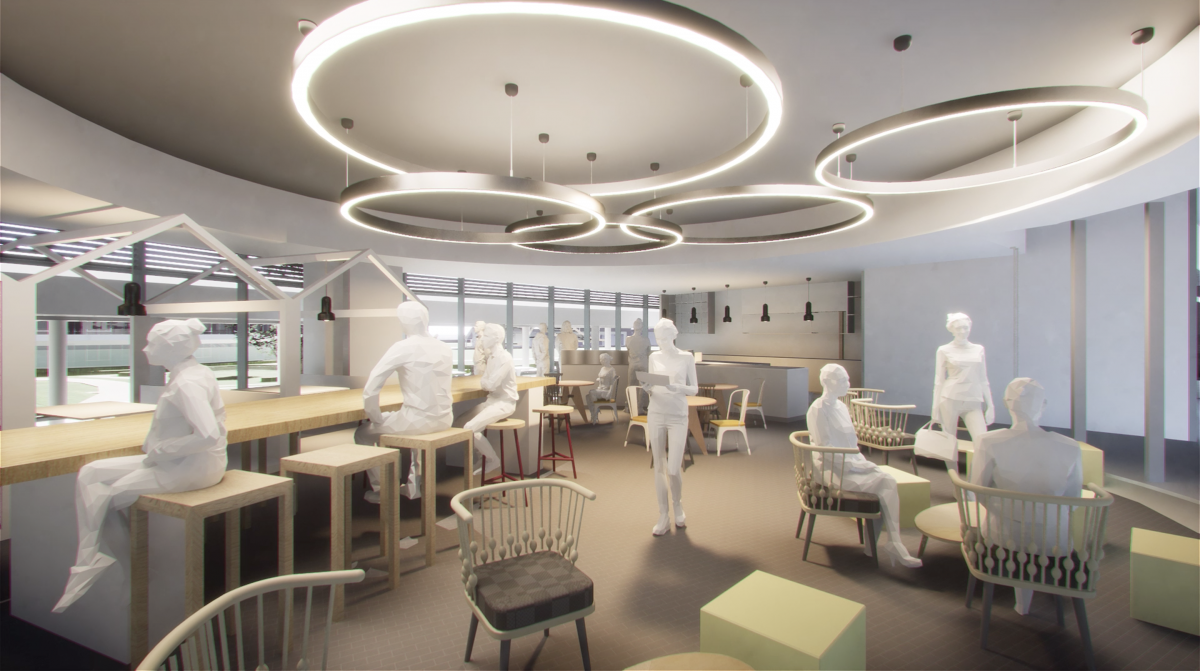
Parent Lounge and co-working space to foster community, collaboration and creativity
How about the arts and culture, how will you include these?
Our curriculum is project based and interdisciplinary, so the arts will play an important role in a lot of what our students do. Of course we also have wonderful facilities, which include art rooms, exhibition spaces, multimedia production and large recording studios, a black-box theatre, dance studios, game design studios, and multiple maker-spaces throughout the school.
How do you incorporate the wellness aspect into your programme?
We have designed VERSO to give students a holistic education. Health and wellness are key components to this. We want students to understand that their mental and physical wellbeing is just as important as their academics, and that school is a place for kids to learn how to be healthy, happy and connected. Wellness and physical activity combined with strong social and emotional support will be part of the daily life at school for all students. If you look at the school in terms of its facilities, the emphasis on sports alone tells you how important the physical wellbeing of our students is. Wellness is a key design principle for us.
Why VERSO?
VERSO offers a fresh choice for families. The entire school experience will be deeply personal for every student and we will have the flexibility to remove a lot of the constraints that traditional schools can’t change. Our goal is to give students a world-class international school education that empowers them to achieve their full potential. We see VERSO as offering students and teachers a highly creative, collaborative environment where kids are active participants because learning has relevance and purpose. At the end of their time here, they will come out ready for the world.
They will be confident young men and women who understand how to navigate the world around them, and that’s really what VERSO is all about.


